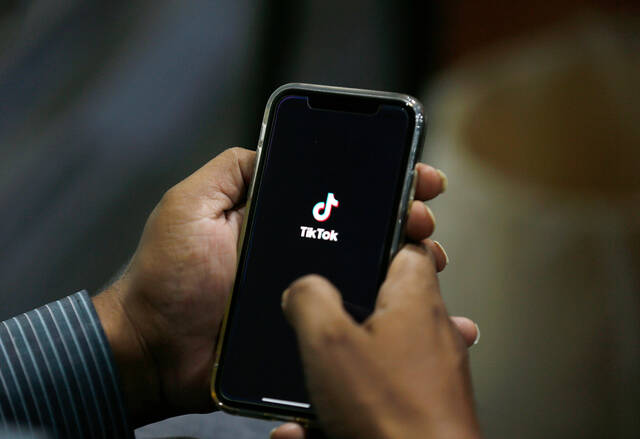The U.S. government in recent weeks has terminated the visas of international students at universities across Pennsylvania, including in Pittsburgh, as part of a national crackdown on foreign scholars.
Students have been targeted at Carnegie Mellon University, the University of Pittsburgh, Penn State University, the University of Pennsylvania and elsewhere.
According to immigration attorneys contacted Tuesday, the students being targeted have had some type of run-ins with law enforcement, including infractions as minor as traffic violations.
At Carnegie Mellon, Provost James H. Garrett Jr. sent a letter to employees and students on campus Monday alerting them seven current or recent students had their student visas revoked by the Trump administration.
It is a trend affecting dozens, if not hundreds, of students across the country.
“These incidents understandably raise wider concerns for many in our community, and we take seriously our continued responsibility to ensure that our community is equipped with the information they need to navigate these uncertain times,” Garrett wrote.
A CMU spokesperson said the school would not comment beyond Garrett’s letter.
Penn State confirmed some of its students have had their visas revoked, although it would not say how many have been impacted.
“It’s an extension of the unconstitutional targeting of people with visas based on flimsy allegations,” said Kristen Schneck, an immigration lawyer and chair of the Pittsburgh chapter of the American Immigration Lawyers Association. “The Department of State is being extremely unnecessarily aggressive.”
Schneck was referring to comments by Secretary of State Marco Rubio about targeting foreign students who were involved in protests or tied to “potential criminal activity,” according to the Associated Press.
Joseph Murphy, an immigration attorney in Pittsburgh, said he’d heard reports in the past 24 hours about affected students who’d been charged with theft, DUI and disorderly conduct.
According to local immigration attorneys, some of the students being targeted may have been arrested but later had their charges withdrawn.
Mark Harley, the chair of the Allegheny County Bar Association’s Immigration Committee, said he’s been told of student visas in Erie being revoked based on traffic violations.
“It’s not just convictions, it’s police interactions,” Harley said.
Murphy said student visa status, in the past, was not typically impacted by minor, summary-level offenses. Until three months ago, a student with that type of charge or conviction would typically leave a courthouse with a fine and then go on with their schooling.
Recently, Schneck said, the Department of Homeland Security is engaging in increased criminal record checks, in some cases flagging contact with law enforcement from several years ago.
“It’s not just students engaged in protected activities or activism,” Schneck said.
Traditionally, she continued, a removable offense for an international student might be a crime of violence or moral turpitude — not minor charges.
“They’re using that as a pretense to revoke their visas,” Schneck said.
‘Pretense’ for revocation
Penn State’s interim vice provost, Sabine Klahr, sent a letter to the campus community Thursday noting some international students there have had their visa status terminated.
The federal government is terminating the students’ records in the Student and Exchange Visitor Information System.
The program, Murphy said, tracks international students and their educational status. If they are terminated in the program, he said, universities may no longer legally enroll the students.
“It’s kind of sinister,” Murphy said.
Student visas typically last for the duration of study, Murphy said, and can also extend to optional practical training or post-graduate work.
At CMU, the university is offering an open forum with Klasko Immigration Law Partners on April 21 for students to obtain in-person guidance.
The provost’s letter also suggests international students strongly consider international travel plans “given the current complexities and uncertainties of the immigration environment.”
In late March, Rubio ordered diplomats overseas to scour the social media accounts of those applying for student visas in an attempt to ferret out those who have “hostile attitudes” toward American government and culture, according to the New York Times.
Immigration attorneys are advising their clients to monitor their emails closely for notice from Homeland Security that their status is revoked.
Schneck thinks, ultimately, these issues will go before the U.S. Supreme Court.
‘Environment of fear’
On Monday, an attorney filed a lawsuit in federal court in Pittsburgh on behalf of a student who learned Friday their record had been terminated in the federal system that tracks them, ending their visa status.
According to the complaint against Homeland Security, the student believes their status was terminated based on a criminal records check.
The student claimed to have been charged with disorderly conduct and public drunkenness. The charges were ultimately withdrawn, and the student’s record was expunged, according to the lawsuit.
A records search with the state police showed no criminal record, the complaint said.
The lawsuit, which seeks class-action status for all students in a similar situation, alleges the student was not given an opportunity to be heard as required under the Administration Procedure Act. It seeks an injunction that would reinstate the student’s record in the federal system.
The lawsuit identifies the student only by initials, does not name the school the student attends or what country they are from.
The National Immigration Project filed similar lawsuits in federal court in California over the weekend.
“These are not isolated cases,” said Khaled Alrabe, a staff attorney at the project.
“We are witnessing a disturbing trend where international students across the nation are losing their status abruptly and without legal justification. (U.S. Immigration and Customs Enforcement) is unlawfully using student status terminations to coerce students to give up their studies and leave the country without any meaningful process or opportunity to challenge what’s happening.”
Murphy said he has started to see clients choose self-deportation for fear of being arrested by ICE agents.
“The plan, I think is to create an environment of fear,” Murphy said. “It appears to be working. It’s getting in the minds of the migrants. Like it or not, the people of the United States voted for this.”
Focus on China
In March, CMU received a letter from the U.S. House Select Committee on the Chinese Communist Party requesting information about the university’s international students and collaborations it has with China-based universities and research institutions.
The letter, sent to six schools including Stanford and Purdue, accused the university of putting American research at risk.
“America’s student visa system has become a Trojan horse for Beijing, providing unrestricted access to our top research institutions and posing a direct threat to our national security,” it added. “If left unaddressed, this trend will continue to displace American talent, compromise research integrity, and fuel China’s technological ambitions at our expense.”
A group of more than 150 students, faculty, staff and alumni at CMU responded with its own letter, asking university leaders to denounce the Trump administration’s “punitive withholding of federal funding and detainment and deportation of international scholars.”








